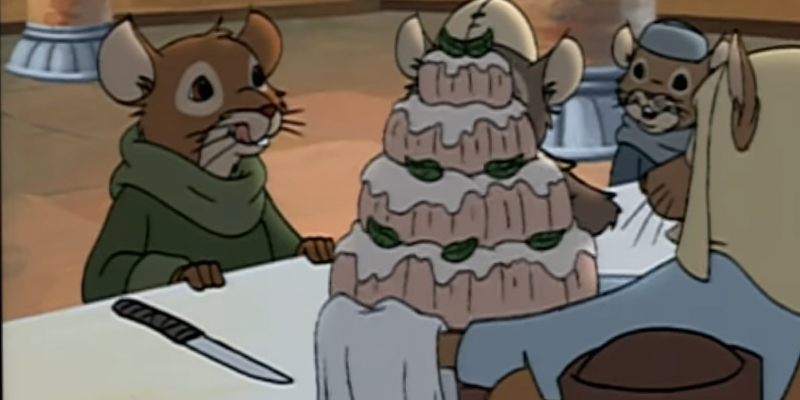
I think about the food in the Redwall books way too often.
Image from Youtube
If you were the kind of young reader that I was, you devoured the Redwall books by Brian “allowed to smoke indoors” Jacques as fast as you could. The medieval-inspired fantasy books about mice, otters, hedgehogs and other forest heroes defending their Abbey against weasels, rats, and stoats were one of my earliest literary obsessions. I read every one of Jacques’ 20+ books I could find, and noticing the similarities in plotting and character arcs across the books were early lessons in craft and taste.
Before we go any further with Redwall, an important clarification: the characters are animal-sized and their world is scaled down. Some poor, misguided folks will tell you that these books are filled with human-sized animals, but the issue has been settled by scientific polling. We’re talking about a world of whimsy here, not a freak show where some rodents fell into the Toxic Avenger ooze. And yes, I know Jacques said in a Q&A that, “the creatures in my stories are as big or small as your imagination wants them to be.” We can all agree that this is a polite smokescreen for younger readers. But we’re all adults here—the characters are small.
What seems to be most enduring about Jacques’ books for me and other readers, though, are his descriptions of food and drink. If you’ve read the books, you know what I’m talking about—no one ever just eats food in Redwall. The descriptions of food unfurl in long lists, cataloged here in impressive detail. The mice food has inspired memes, a Twitter bot, a drinking game, and a cookbook.
Jacques is sumptuous, even gratuitous in his descriptions of food and drink. In the first book, Jacques writes of “tender freshwater shrimp garnished with cream and rose leaves, devilled barley pearls in acorn puree, apple and carrot chews, marinated cabbage stalks steeped in creamed white turnip with nutmeg.” The Bellmaker has dishes of “turnovers, trifles, breads, fondants, salads, pasties, and cheeses alternated with beakers of greensap milk, mint tea, rosehip cup and elderberry wine.” Even a simple breakfast at the cave of a mouse named Bobbo in Mariel of Redwall is lavished with description: “Now, you will find a small rockpool outside to wash in, and I will prepare wild oatcakes, small fish, and gorseflower honey to break your fast.”
A pet theory I have about fantasy is that to work, the fantastical, invented elements can’t feel goofy. Bad fantasy names are easy to parody because they feel like clunky stand-ins for something that’s meant to be evocative. There’s a very thin line between a description that conjures plausible textures and one that reads like “cool thing TK.”
Jacques’ foods are so memorable and convincing because they pass that test. He combines real foods—fresh cream, cakes, herbs, pies, mint tea, and juices—with more archaic and invented terms—pasties, trifles, meadow cream and barkbrew beer. Just enough real to feel close at hand, but just enough fantasy to feel transportive.
As a kid, I was always looking for berry cordials in the grocery store, imagining something refreshing and effervescent. Imagine my disappointment to discover that they’re actually syrupy boozes favored by Renaissance Faire enthusiasts and home-brewing dads.
The tiny feasts make Jacques’ world believable. They imply the labor and love of mouse bakers rolling out dough, fields of wheat to be ground in tiny mills, and squirrels making cheese from non-dairy milks. (Side note: with little exception, everything’s apparently vegan. According to Jaques on redwall.org: “The sap of many plants can be used to make vegetarian versions of milk, cream, butter and cheese… If you squeeze a green plant you can extract sap. Thus, greensap milk.”)
It all sounds so damn good, too. There’s never any sawdusty survival food or weightlifter-fuel hunks of meat. Each dish is delicious and lovingly crafted, a little Martha Stewart dollop of the finer things in life.
Putting this delight in the pleasures of food on the page was Jacques’ goal, as both a fantasy and corrective. Among a collection of quotes about his food writing, Jacques writes about his “frugal childhood” filled with shortages:
…apart from Red Cross parcels sent to families who lost a father abroad, I never tasted chocolate or candies until I was almost seven years old!! I also never tasted any fruit but an apple. I had heard of bananas and thought that they were something that someone made up for a story!
He would turn to cookbooks to sate himself, but found none of this in the other books he read:
It used to drive me completely bonkers when I would read in some story or book “and the King gave a great feast for all his people.” And I would think “Hang on now! What did the King serve? Was there enough for everybody? What did they eat? What did they drink? And just what is ‘mead’ anyway? Were there tons of pastries for everyone? Was there music and singing? Did they all have a great time?” So when I wrote my stories, I made sure that I described, in minute detail, the feasts at Redwall Abbey.
It’s Jacques’ update on the old adage of writing something that you would want to read: write what you want to eat, and make sure there’s enough for everyone.
James Folta
James Folta is a writer and the managing editor of Points in Case. He co-writes the weekly Newsletter of Humorous Writing. More at www.jamesfolta.com or at jfolta[at]lithub[dot]com.



















